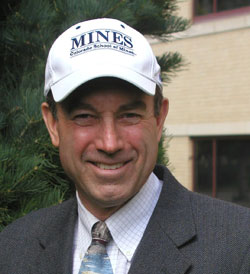2005 Distinguished Lecture Series: Craig W. Van Kirk
Craig W. Van Kirk
Biography
 Craig Van Kirk has had the pleasure of serving Mines’ Petroleum Engineering (PE) Department on the faculty since 1978 and as its Head since 1980. After 26 years as PE’s Department Head, he has many experiences and observations and a few ideas to share with the Mines community and friends.
Craig Van Kirk has had the pleasure of serving Mines’ Petroleum Engineering (PE) Department on the faculty since 1978 and as its Head since 1980. After 26 years as PE’s Department Head, he has many experiences and observations and a few ideas to share with the Mines community and friends.
Prior to joining Mines in 1978 to satisfy his career plan to be a professor in Mines’ PE Department, Craig worked in the petroleum industry in the areas of exploration, drilling, production, and reservoir management. He spent three years with Humble Oil Company (1967-1969) in California, five years with Shell (1969-1974) in Denver, and five years with Scientific Software (1974-1978) working out of Denver on global petroleum reservoir problems.
Craig earned his BS degree in PE from the University of Southern California in 1968 and his MS in PE in 1969, also from USC. In the summer of 1969, he and his family moved to Golden to begin his Ph.D. program in PE at Mines and to work for Shell in Denver.
During his tenure at Mines, he has taught most of the undergraduate courses in the PE curriculum and many graduate courses. Also, Craig has supervised Masters and Ph.D. graduate students on research in the areas of reservoir management, economic evaluation, simulation, and enhanced recover. He especially enjoys working with integrated multidisciplinary teams on global oil and gas reservoirs to optimize the value to humanity. Throughout his years of supervising Mines graduate students on their research projects, he has served as the Principle Investigator and managed several million dollars in funded research sponsored by the USA Department of Energy, Department of Education, the Gas Research Institute, private industry, and others. Since 1996 he has been the Director of Mines’ M. King Hubbert Center for Petroleum Supply Studies.
In addition to assisting students on their thesis documents and writing reports to research sponsors, he has published articles and monographs in the private and public domain on reservoir management and related topics.
Craig has provided both written and oral testimony to the U.S. Congress and National Academies on topics of national energy concerns. Also, he has enjoyed being an invited speaker for numerous events, private companies, and government agencies throughout the world, on every continent on Earth except the Antarctic. The subjects have included education, research, practical application of technology, organizational structures, and how to train and integrate diverse people into useful multidisciplinary teams.
His service efforts have included Mines faculty advisor to the student chapters of the Society of Petroleum Engineers (SPE) and the American Indian Science & Engineering Society (AISES). Also, Craig has been busy with the SPE on a global basis, serving on or chairing several committees and serving on the Board of Directors for 1990-1993. In 1997, he was honored by the SPE as a Distinguished Member, and in 1998, the PE Department received the SPE Rocky Mountain Service Award.
Craig has provided analyses and advice to the U.S. Government on the development and operations of the Waste Isolation Pilot Project (WIPP) in New Mexico and the National Strategic Petroleum Reserve (SPR) along the U.S. Gulf Coast.
His most prized “honors” are the several times he has been voted by PE’s graduating class as that semester’s “Outstanding Faculty Member in PE.” Also, during his first (and only) sabbatical leave during the 1996-97 academic year, he returned to his small home town and volunteered at the high school and the adjacent Native American Indian reservation as a teacher, mentor, advisor, and tour guide.
Mines’ Outreach (SPACE) activities have played a significant role in Craig’s extension of his expertise, such as training Chinese professionals, helping develop and support the Abu Dhabi Petroleum Institute, and current efforts to establish and expand Mines’ presence in Egypt and the Middle East Region.
Craig is a Registered Professional Engineer and a member of the National Society of Professional Engineers. Also, he has been elected to Tau Beta Pi, Pi Epsilon Tau, Sigma Xi, and Blue Key. His family includes his wife, Denice, of 39 years, two children, and six grandchildren.
Abstract
The Colorado School of Mines has enjoyed the satisfaction and recognition resulting from its hard and good works for many years, and its future impact on national and global events should be significant and beneficial. One of the uncommon characteristics and strengths of Mines is its incorporation of multiple perspectives, arising from the world-wide variety of students, alumni, faculty, staff, and global partners in research, service, and exchange programs.
This lecture will present observations on the integration of people with different backgrounds and ideas, and the benefits of integrating their multiple perspectives based on their individual education, expertise, experience, and expectations.
The optimum management of Earth’s reservoirs of natural resources, such as, oil, natural gas, et al., (including human resources!) requires a balanced combination of multiple views, efforts, conclusions, and actions. Examples involving the integration of multiple perspectives will be presented based on personal experiences both on campus and in conjunction with global partners.
Also, the multiple-perspective-integration theme will be compared with many years of personal observations at Mines, including the new Strategic Plan. Suggestions will be offered for improving Mines’ successes with (and for) students, alumni, colleagues, global partners, et al.
If time and safety laws permit, an experimental demonstration will be conducted using pressurized fluids with gas-in-solution in a liquid to simulate a natural resource reservoir and the management technique which will generate the optimum value to humanity. Immediately following the experiment, the survivors will be invited to participate in a discussion of their perspectives of what they believe they saw, heard, smelled, tasted, or felt.